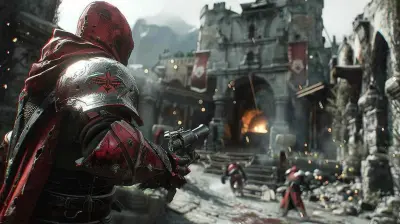The Connection Between Story Complexity and Player Investment
6 September 2025
Let’s cut straight to the chase: if you’ve ever found yourself glued to your screen at 3 a.m. because your game character just got betrayed by their best friend (whom you trusted with your virtual life), then you've already felt the electric shock of story complexity. But let’s dig into why that gripping plot had you hooked like a fish on a line—and why storytelling in games isn’t just a side dish, but the juicy steak of the gaming meal.

Simple Game? Fun. Complex Story? Obsession.
Okay, not every game needs to read like Shakespeare meets "Game of Thrones." Tetris didn’t need a backstory about the haunted Soviet block factory to be addictive. But when we talk about the connection between story complexity and player investment, we're diving into how deeply players embed themselves in a game—emotionally, mentally, and sometimes even physically (hello, 12-hour gaming binges).So, why do players fall head-over-heels for games with rich, tangled plots? Let’s break this down, piece by pixelated piece.
What Exactly Is Story Complexity in Games?
Alright, story complexity isn’t just about adding more drama—like a soap opera, but with more dragons and fewer awkward pauses.We’re talking about:
- Multi-layered narratives: Not just a "bad guy = bad, go punch" storyline. Think twists, flashbacks, character development, and motivations that hit harder than a Dark Souls boss.
- Character depth: Characters with real flaws, goals, and backstories—not just cardboard cutouts who exist to hand you your next quest.
- Branching choices: Your actions matter. Choices impact the story. You screw up? Characters remember. (Cue the guilt trip.)
- World-building: Lore so rich, you could write a college thesis about it. Looking at you, Elder Scrolls.
In short, story complexity means games that don’t just tell you a story—they invite you to live one.
Why Do We Crave Complexity?
Humans are nosy. We love drama. We binge-watch, eavesdrop, and deep-dive into fan theories because we’re wired to crave stories that challenge us.Games tap into that, but with a twist—you’re not just watching. You’re part of it.
Emotional Investment Hits Different When You’re in Control
When the game lets you steer, every plot twist hits harder. You’re not just watching a character make a mistake—you made that choice. You're not sitting back while someone gets betrayed; you're clutching your controller, whispering “no, no, no” as it all goes downhill.Games like The Witcher 3, Mass Effect, and Red Dead Redemption 2 don't just throw stories at you. They suck you in with decisions that ripple across the world. And that ripple? That’s exactly what yanks players into the deep end of investment.
Choice + Consequence = Deep Player Immersion
Let’s say you’re playing an RPG and you have two choices:1. Save the village of fluffy, innocent puppies.
2. Burn the village to the ground for loot.
In a simple story, both choices probably lead to the same boss fight. Who cares, right?
But in a complex story? Saving the puppies might lose you favor with a powerful faction. Burning it might unlock a dark storyline where your character wrestles with morality. Now, your choices carry weight—and boy, do players feel it.
That’s not just storytelling. That’s manipulation by design. Sweet, immersive manipulation.
The Role of Lore and World-Building
Ever fallen down a rabbit hole reading every book in Skyrim? Or spent hours listening to random NPCs in Cyberpunk 2077?That’s world-building, baby.
A complex story makes the world feel alive. When a game’s universe has its own history, politics, religions, and feuds, it makes your actions feel like they exist in a living, breathing ecosystem. And in turn, you get more attached. You care more. You fight harder. You replay longer.
Character Development Isn’t Just for Netflix Dramas
You remember Arthur Morgan not just because he was a gunslinger in Red Dead Redemption 2—you remember him because you watched him grow. You helped him change, made decisions with (and sometimes for) him, and shared in his victories and gut-wrenching defeats.When a game nails character arcs, it becomes more than pixels and polygons. It becomes personal.
Games like Horizon Zero Dawn and God of War took us on emotional roller coasters not with spectacle alone, but with characters you felt like you really knew. And when you feel like you know someone, you stick around for their story.
Complexity Keeps Players Coming Back (and Talking)
Let’s get real: people don’t start Reddit threads, make memes, or write essays about games with boring plots. Complexity creates community.- Players love to compare choices: “Wait, you killed who?!”
- Theories run wild: “Is this NPC secretly the villain?”
- Entire wikis are born from lore so deep it makes LOTR look like a bedtime story.
When a story’s rich enough, it doesn’t end when the credits roll. It lives on—online, in conversations, and in our heads rent-free.
Complexity Doesn’t Mean Confusion
Now hold up. Before you go thinking that a complex story has to be a tangled mess of timelines and characters with twelve backstories each—it doesn’t.Great storytelling knows how to layer without losing the thread. Games like Life is Strange prove that even slower-paced narratives with a smaller scope can offer depth without overload.
So, it’s not about making things complicated—it’s about adding depth and letting players swim deep instead of wading through a kiddie pool of plot.
The Balance of Gameplay and Narrative
“But what about the gameplay?” you might ask. “Isn’t a game supposed to be… well, fun?”Absolutely. But here's the deal: when narrative and gameplay work together like a tag-team from heaven, that’s when magic happens.
Think of games like The Last of Us—the combat is intense, sure, but the emotional gut punches? That’s what sticks. You remember the quiet, painful conversations more than the gunfights. And that’s a sign of a game that understands the narrative/gameplay rhythm.
It’s not either/or. It’s both. That’s the secret sauce.
Indie Games Flex Story Power Too
You don’t need AAA budgets to deliver a knockout story. Indie games have been dominating the narrative game lately—and fans are living for it.Just look at:
- Undertale: Quirky, funny, and heartbreakingly deep.
- Celeste: A platformer wrapped in a story about mental health and self-discovery.
- Disco Elysium: Dialog-heavy and mind-bending, with choices that’ll break your brain in the best way.
These games prove you don’t need cinematic cutscenes to get players emotionally invested. Just a well-written story and meaningful choices.
TL;DR — Complex Stories = Committed Players
Let’s wrap this up like a well-spun side quest.🎮 Complex storylines create emotional bonds.
🎮 They drive player choices and replayability.
🎮 They foster deeper immersion and community discussion.
🎮 They elevate games from “something you play” to “something you feel.”
Story complexity isn’t fluff. It’s fuel. And when developers get it right, they don’t just build games—they build experiences that we carry with us long after we log off.
And if you’ve ever sobbed at a pixelated goodbye or stared at your screen in shock because your favorite character just double-crossed you?
Well, friend, you know the power of story complexity.
Final Thoughts: Players Want to Care
At the end of the day, we want to care. Whether we’re wielding swords, solving puzzles, or commanding starships, we want to feel connected. And that connection isn’t just about flashy graphics or big explosions—it’s born from well-told, complex stories that pull us in and won’t let us go.So game devs, take note: give us characters we’ll love (and sometimes hate). Give us decisions that haunt us. Give us worlds we’ll lose ourselves in. Because that’s the secret to building games we’ll never forget.
all images in this post were generated using AI tools
Category:
Game StorylinesAuthor:

Tayla Warner
Discussion
rate this article
1 comments
Alvin Sweeney
This article astutely highlights that intricate narratives can deepen player investment, yet risks alienating some. Striking a balance between storytelling depth and accessibility is crucial for engaging diverse audiences effectively.
September 7, 2025 at 4:18 AM

Tayla Warner
Thank you for your insightful comment! I completely agree that balancing storytelling depth with accessibility is key to engaging a wide range of players.


